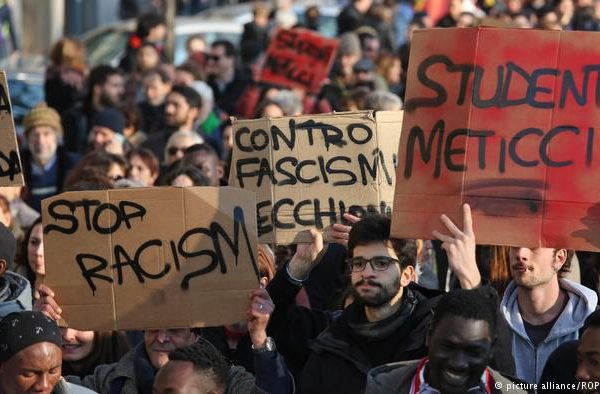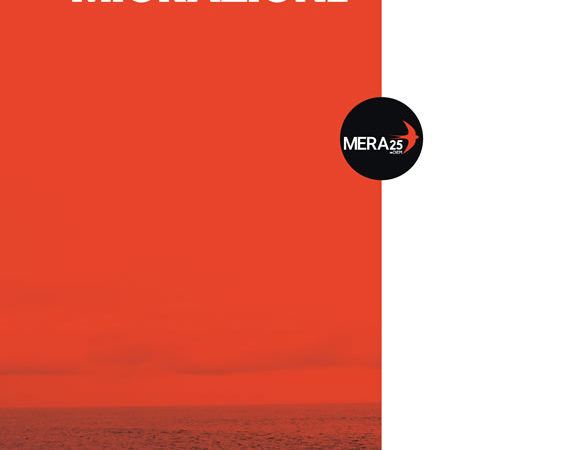Last Saturday in the centre of the Italian city of Macerata, a young man affiliated with the extreme-right opened fire on Gideon Azeke, Jennifer Otiotio, Mahmadou Touré, Wilson Kofi, Festus Omagbon and Omar Fadera. They were singled out because of the colour of their skin and their African origins.
Several days prior to the attack, several suitcases had been found in Macerata containing the mutilated body of a young female drug addict, Pamela Mastropietro. The principal suspects of the grisly murder at present are two Nigerian drug dealers. The gunman who perpetrated Saturday’s attacks said in his confession that he’d gone out hunting black people to avenge the young girl’s death, and with the intention of killing every immigrant selling drugs. The media were quick to portray the attacks as the acts of a mentally unstable individual or as crimes of passion, but the environment in which the attacks occurred weakens the case for either of these explanations.
On the contrary, rather than avenging the young woman’s murder, the gunman sought to send a clear message to his compatriots: immigration is a threat to all of us, particularly for the most vulnerable members of society.
Unfortunately, this message found itself an eager audience. Leaders of the Italian ‘far-right’, notably Matteo Salvini and Georgia Meloni, have seized every opportunity to hammer it home, stating that while the attacks were of course criminal, ultimate responsibility for them rests with “those who would fill Italy with migrants.”
Our response must be to call things by their right names: what happened in Macerata was an act of fascist terrorism, the most serious attack of its kind since Italy’s “Years of Lead.” This act was intended not only to sow terror among people of colour living in Italy, but also to play on the pervasive fears that haunt Italian political opinion concerning immigration. Furthermore, beyond matters of political opinion or party affiliation, the theatricality of the attacker’s surrender to the police displayed precisely those elements constituting the essence of an underlying fascist ideology: that is to say, fascism as an obscene death cult. Why then do Italy’s political leaders seem unwilling to recognise these facts?
The centre-left’s failure to recognise the racist and fascist nature of the shootings is nothing less than the culmination of a series of abdications of responsibility. These abdications, like self-fulfilling prophecies, have been the logical outcome of the assumption that Italian public opinion has been won over by a “xenophobic” or “anti-anti-fascist” common sense. Accordingly, progressive forces in Italy have tolerated the emergence of what Hannah Arendt called “race-thinking,” which is now in the process of solidifying into a genuine “racist ideology.”
Immigration tropes
The “immigration as a social problem” trope has become an established fact across the political spectrum, with the result that the divide between different political options has shifted from the question of the problem itself to that of its possible solutions. Therefore, the various political actors, while not necessarily engaged in “race-thinking” themselves, have come to adhere to a single discursive framework in which immigration policy becomes the fundamental problem.
It does not matter how much effort is put into statistical evidence proving the falsity of the idea that “native Europeans” are being invaded and replaced by African migrants. As Hannah Arendt reminds us, an ideology is not a theoretical doctrine, but an arm of mass persuasion appealing to the “immediate political necessities” of men and women, in other words to their lived experience and desires.
There is no point in calling for thoughtful reflection and silence, as did the mayor of Macerata, when, fearing further division and violence, he called for the cancelation of an antiracist and antifascist rally organised for February 10 in his home town. Rather than appeasing tensions, the silence the mayor calls for runs the risk of leaving an open space for the voices of those who sow hatred, because at the moment, it is those voices who occupy the foreground of public debate.
Silence no solution
It is for this reason that the struggle against the sort of barbarity we have seen in Macerata calls not for silence, but for powerful symbols. We must counter the pseudo-heroic acts of the fascist gunman with thousands of daily acts of resistance. We must counter the fascist death cult with the phrase used in the Zapatista communities of Chiapas to welcome visitors who come as friends: “Long live Life, down with Death!” With this in mind, we of DiEM25 Paris and DiEM25 France welcome the success of last Saturday’s rally, which, despite all opposition, drew thousands of committed citizens to Macerata and sparked solidarity demonstrations all over the world. We invite all who want to stop the race to barbarism on our continent to seize any occasion to speak up against racism and fascism, in a spirit of solidarity and constructive disobedience.
Viva la vida y muera la muerte!
Nicola Bertoldi is currently pursuing a PhD in history and philosophy of science at the University of Paris 1 and is an active member of DiEM25.
Translated by Simeon Gallu DiEM25 Paris
Photo: Danilo Balducci/Press Assocation.
Volete essere informati delle azioni di DiEM25? Registratevi qui!




